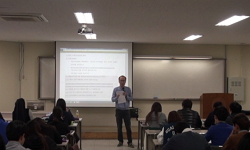What explains the individual social policy preferences? Some low-wage workers choose not to support for the social insurance, which could raise a question whether individual income can explain the preferences for welfare state. To understand the prefe...
http://chineseinput.net/에서 pinyin(병음)방식으로 중국어를 변환할 수 있습니다.
변환된 중국어를 복사하여 사용하시면 됩니다.
- 中文 을 입력하시려면 zhongwen을 입력하시고 space를누르시면됩니다.
- 北京 을 입력하시려면 beijing을 입력하시고 space를 누르시면 됩니다.
Between preferences and policy : minimum wage, preferences for social insurance and social policy outcome
한글로보기부가정보
다국어 초록 (Multilingual Abstract)
In this paper, I argue that the growth rate of minimum wage may have a negative relationship with social policy preference of low income group because low wage workers would stand up for the small and pro-business government to maintain the upward tendency of their wage. Also, the increase in minimum wage would have a positive relationship with social spending since the rise of minimum wage has a impact to reduce the income distance between the low and the middle. To test these propositions, I use both micro-data on social preferences from ISSP survey for 11 countries over the period 1990 to 2006 and macro-data of national social spending for 15 countries between 1991 and 2006. The findings are supportive of my hypothesis. Therefore, I conclude that the increase in minimum wage exerts downward pressure on people’s preference for social insurance, and it has a positive relationship with social policy outcome.
What explains the individual social policy preferences? Some low-wage workers choose not to support for the social insurance, which could raise a question whether individual income can explain the preferences for welfare state. To understand the preferences for social insurance, especially in low income group, this paper presents the “minimum wage” which has been received little attention even if it is one of the important factors that influence on the lives of low income group.
In this paper, I argue that the growth rate of minimum wage may have a negative relationship with social policy preference of low income group because low wage workers would stand up for the small and pro-business government to maintain the upward tendency of their wage. Also, the increase in minimum wage would have a positive relationship with social spending since the rise of minimum wage has a impact to reduce the income distance between the low and the middle. To test these propositions, I use both micro-data on social preferences from ISSP survey for 11 countries over the period 1990 to 2006 and macro-data of national social spending for 15 countries between 1991 and 2006. The findings are supportive of my hypothesis. Therefore, I conclude that the increase in minimum wage exerts downward pressure on people’s preference for social insurance, and it has a positive relationship with social policy outcome.
목차 (Table of Contents)
- 1. Introduction 1
- 2. Literature Review on Welfare Preferences 6
- 1) Review of the Literature on Economic Factors 6
- 2) Review of the Literature on Ideology and Norms 9
- 3) Review of Literature on Individual Characteristics 10
- 1. Introduction 1
- 2. Literature Review on Welfare Preferences 6
- 1) Review of the Literature on Economic Factors 6
- 2) Review of the Literature on Ideology and Norms 9
- 3) Review of Literature on Individual Characteristics 10
- 3. Argument 12
- 1) The Preferences of Low Income Group 12
- 2) Effect of Minimum Wage on the Preferences 14
- 3) Change in Structure of Inequality by Minimum Wage 19
- 4. Empirical Analysis 22
- 1) Micro-Analysis of Policy Preferences 22
- 2) Macro-Analysis of Policy Outcome 37
- 5. Contribution and Implication 48
- Appendix 51
- References 52












